Curated OER
GCSE Notes 2000: Classical Music
Classical period music is defined by its characteristics and distinctive sound. A set of notes assists upper graders in recalling and analyzing music from the classical period based on musical terminology. An example analysis of Eine...
Curated OER
Humor and Iconicity in Classical Music
Scherzo, cappricio, divertimento, and rando are all addressed in this look into humor through this classical music presentation. The slide show is very basic, but has some good background on Mozart, Haydn, Beethoven, and Bach. The...
Curated OER
Classical Period Music - 1750-1810
In this classical music worksheet, students examine a graphic organizer that explains 7 characteristics of the music. They examine characteristics such as melody, timbre, texture, dynamics, and melody. There are no questions associated...
Curated OER
"Viennese Musical Clock"
Fourth graders learn about musical patterns as they play a game called fudge. Students are assessed based on whether they were able to identify and play a steady beat, use the appropriate form, and clap the rythmic patterns.
Hawaiʻi State Department of Education
ABA Form in Music
Patterns happen everywhere, in music, math, and language! Fourth graders listen to the "William Tell Overture" visualizing the patterns that they hear. They then discuss and write an ABA poem that matches the ABA form found in the music...
Curated OER
Rondo with B-A-G
Learners explore music notes. In this music instructional activity, students sing the song "Hot Cross Buns" and practice playing it on melody bells to find the letter and rhythm notation. They create a new phrase to the rhythm of this...
Curated OER
Listen to Music
Young scholars listen to, analyze, and describe music. They identify examples of music forms including such as motive phhrase, 4-bar phrase,
canon, and rondo. In addition, they perform a dance called a partner mixer and model the pattern...
Curated OER
West Virginia Def PB Wants You!
Students write, adapt, and compose a song related to the West Virginia State Museum. In this music lesson, students create a composition for a work of visual art. Students incorporate major and minor melodies.
Curated OER
Describing Music
Fifth graders listen to the 9th symphony and identify the tiri-ti rhythm. They identify the number of times they hear a phrase "turn, turn, turn". They then describe the meaning of one song and answer questions in class discussion.
Curated OER
Characteristics of the Classical Period
In this music worksheet, students identify the specific characteristics of the Classical Period in music. They define seven key terms related to the period and who the composers were of that time period.
Hawaiʻi State Department of Education
Pease Porridge
Practice using different ways to express a single pattern. The class uses concrete, pictorial, and numerical modes to represent patterns found in a simple rhyme. They will move their bodies, use body percussion, draw, and use numbers to...
ArtsNow
Arts Now Learning: Exploring Habitats Through Music Composition [Pdf]
In this lesson, young scholars will learn about rondo form and practice a chant. After learning about the structure of the chant, they will work in small groups to create a chant about a habitat. The chants will then be combined with the...




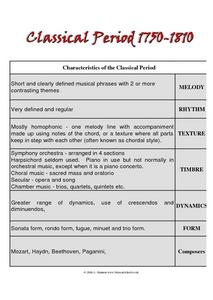



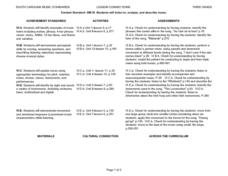
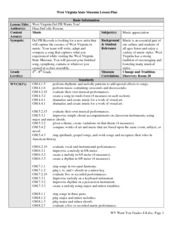
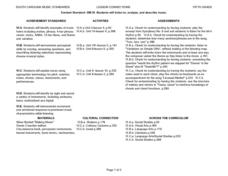

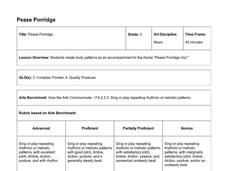
![Arts Now Learning: Exploring Habitats Through Music Composition [Pdf] Lesson Plan Arts Now Learning: Exploring Habitats Through Music Composition [Pdf] Lesson Plan](https://d15y2dacu3jp90.cloudfront.net/images/attachment_defaults/resource/large/FPO-knovation.png)